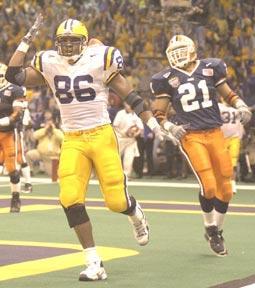Reared in a New Orleans neighborhood filled with poverty and drugs, former LSU tight end Robert Royal has risen above that and has maintained a roster spot with the Washington Redskins for the past two seasons.
Royal said playing in the NFL is a dream come true. He said he never wants to go back to those situations he faced during his childhood.
“It’s just great any time you can accomplish your dreams,” Royal said. “[Growing up in a rough neighborhood] teaches you so many things – to have perseverance through the tough times. Once you get on the right track you never want to go back. I don’t want my daughter to be put in the same circumstances.”
The Redskins drafted Royal in the fifth round of the 2002 NFL draft with the 160th overall selection. He became the Redskins’ starting tight end this season with five receptions for 48 yards before suffering a season-ending injury (fractured right hip) against Tampa Bay on Oct. 14.
The injured reserve list has become a dwelling place for Royal during his first two seasons in the NFL. He also suffered a high left ankle sprain that placed him on the IR for the entire 2002 season.
Despite the setbacks of the past two years, Royal’s former football coach Dennis Lore at Edna Karr Junior High said Royal remains positive.
“I talked to him two days later,” Lore said. “Robert is the kind of kid that nothing affects him for a long time. Nothing really bothers him.”
Lore said Royal knows how to handle this type of situation because of his easygoing personality.
“Robert was the type of kid who always had a great sense of humor,” Lore said. “He was a jokester, but he always knew where to draw the line when it was time to get serious.”
The blocking aspect Royal brings to the Redskins is one that makes him a great NFL tight end, Lore said. He said Royal has good hands as well but does not get to showcase that talent as much under Steve Spurrier’s offense.
Lore said Royal wanted to repay him for the positive influence he had on Royal’s life.
“I did that here with a lot of the kids here at school,” Lore said. “Most of them came from homes with single mothers where the parents had left. When you showed an interest in the kids they came to you … he came to me for advice.
“Robert told me he wanted to pay me back for all the help I gave him. I told him the only thing I enjoy is watching young people grow up and succeed.”
Royal’s mother Anette said her son’s success at football is important, but she is glad that he earned a degree in kinesiology. She said she still stresses education even with his current success.
“He’s doing great,” Anette said. “He just needs to keep on educating himself more and more.”
Royal said the other major influence in his life was his grandmother, who passed away about a year ago. He said she fought for him to have opportunities he would not have had otherwise by keeping him out of trouble.
“She kept on pushing for me, fighting for me,” Royal said. “For the most part she raised me and was my backbone. Just to see how strong she was, I knew I had to be strong.”
Keeping close to his family and friends back home has always been important for Royal. Lore said location was an important factor when he decided to attend LSU.
“Robert wanted to go somewhere close where his family and friends could watch him,” Lore said. “I was happy to be at every game. He made some great catches.”
The catch Royal said he remembers most is the game-winning reception he made on the first play in overtime against Tennessee in LSU’s 38-31 victory in 2000. He said playing at LSU was definitely a stepping stone to the NFL.
“I’ve given my hat off to LSU,” Royal said. “I was able to come through LSU and have success. It made me adjust to the NFL game a lot faster.”
LSU coach Nick Saban said he is not surprised that Royal has achieved and maintained NFL status.
“He was a great player and did a great job for us,” Saban said. “He’s a good person, and it doesn’t surprise me at all that he’s a starter in the league. I’d take as many Robert Royals on our team as we could possibly get.”
Royal said Saban is a competitor and helped him to realize the importance of playing team-oriented football by requiring everyone including starters to play on special teams.
Spurrier brings the same kind of competitiveness to the table, Royal said. He said he respected Spurrier when he coached Florida, but he respects Spurrier even more now as his coach.
“I’m on his side now,” Royal said. “You get the sense more in person that he’s a true competitor. He puts you in a position to make plays and to win.”
Current LSU tight end Eric Edwards said Royal has put him in a position to be successful as a football player and a person.
“He was a real good player, a smart player,” Edwards said. “He kind of helped bring me up and when he was here I learned a lot from him running routes and catching the ball … he showed a lot of leadership.
“He was real good when he was playing here and he looks even better playing there.”
From rags to ‘Royal’ty
November 4, 2003

From rags to ‘Royal’ty



